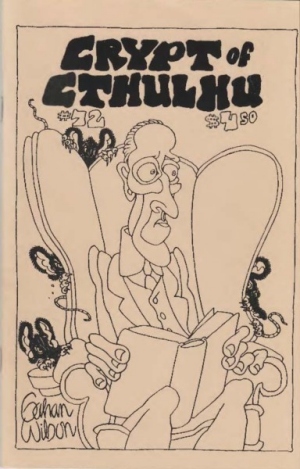Birthday Reviews: Peter H. Cannon’s “Cats, Rats, and Bertie Wooster”

Peter H. Cannon was born on October 19, 1951.
Cannon’s non-fiction book H.P. Lovecraft was nominated for the 1990 Bram Stoker Award. Cannon also works as an editor for Publisher’s Weekly, handling mystery and thriller reviews. Many of Cannon’s stories are strongly based on the works of H.P. Lovecraft, Arthur Conan Doyle, Frank Belknap Long, and P.G. Wodehouse.
Peter H. Cannon originally published “Scream for Jeeves; Or, Cats, Rats, and Bertie Wooster” as by H.P.G. Wodecraft in the Roodmas 1990 issue of Crypt for Cthulhu, #72, edited by Robert M. Price. The story was reprinted the next month in Dagon #27 and in 1994, Cannon published it as “Cats, Rats, and Bertie Wooster” using his own name, P.H. Cannon, in his collection Scream for Jeeves: A Parody. The story also appeared in 1996 in Cannon’s The Lovecraft Papers and in 1999 in his collection Forever Azathoth and Other Horrors. In 2009, it was translated into French for inclusion in Patrick Marcel’s collection of essays Les nombreuses vies de Cthulhu which included Cannon’s story as well as a story by Kim Newman.
“Cats, Rats, and Bertie Wooster” places P.G. Wodehouse’s Bertie Wooster and his butler, Jeeves, in a Lovecraftian milieu, the Exham Priory in Anchester, Wales, where the character finds himself in the 1923 story “Rats in the Walls.” Invited to the Priory by his friend Captain Edward “Tubby” Norrys, Bertie makes the acquaintance of Pop de la Poer who shares his family history with Bertie, despite Bertie’s clear indifference. The presence of rats in the walls of the priory and the discovery of ancient cellars beneath it lead, as in Lovecraft’s original story, to a later expedition into the depths, an expedition which includes many learned men as well as Bertie because De la Poer and Norrys want Jeeves to participate.
While Wodehouse’s Wooster is an incurious prig, Cannon’s Wooster takes that a step further, not only being self-involved, but actively stupid. Jeeves, on the other hand, is not just a competent butler, but an erudite, well-read, intellectual. Because the story is told from Wooster’s point of view, Cannon can allow his indifference and idiocy obviate the need to provide any real explanation for what is happening. Wooster just isn’t up to the task of related the horror that is found in Lovecraft’s original tale. The result is a parody of Lovecraft that never quite works and a parody of Wodehouse which seems to miss the mark.